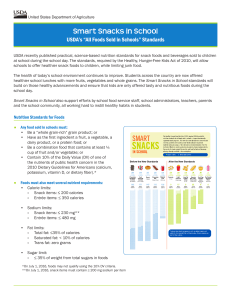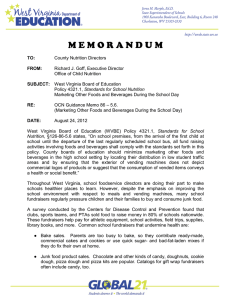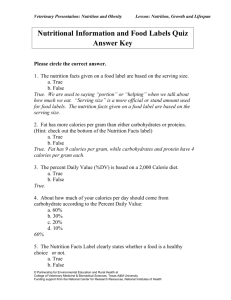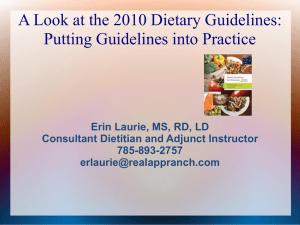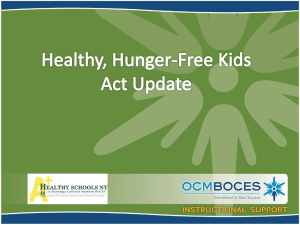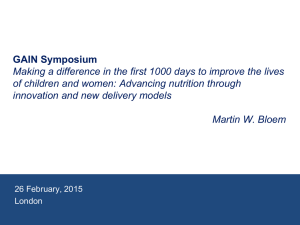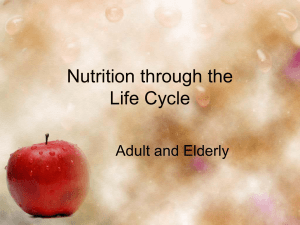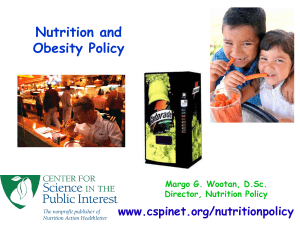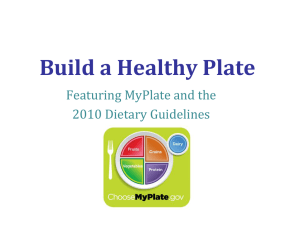Nutrition Standards for All Foods Sold in School
advertisement
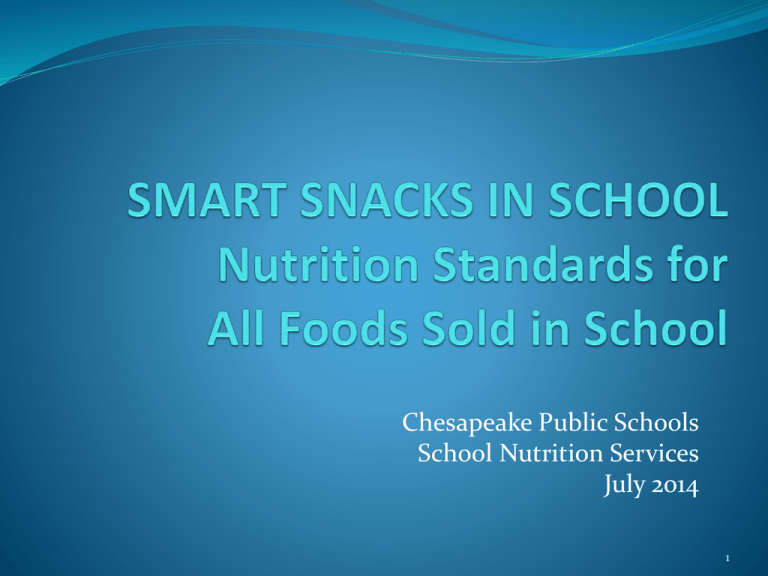
Chesapeake Public Schools School Nutrition Services July 2014 1 The School Nutrition Environment Improving the nutritional profile of all foods sold in school is critical to: improving diet and overall health of American children; ensuring children from all income levels adopt healthful eating habits that will enable them to live productive lives; and helping children make healthier choices and reduce their risk of obesity. 2 Healthy, Hunger-Free Kids Act 2010 Provided USDA authority to establish nutrition standards for all foods and beverages sold outside of the Federal child nutrition programs in schools. The law specifies that the nutrition standards shall apply to all foods sold: outside the school meal programs; on the school campus; and at any time during the school day. 3 Where? Including: a la carte in the cafeteria in school stores snack bars vending machines other venues Implementation by: July 1, 2014 4 State and Local Flexibility The nutrition standards included in the interim final rule (currently in comment period) for all foods sold in school are minimum standards. State agencies and school districts may establish additional standards. (VA is considering standards at this time.) State or local standards must be consistent with Federal standards. 5 6 What are competitive foods? Competitive food: all food and beverages sold to students on the School campus during the School day, other than those meals reimbursable under programs authorized by the National School Lunch Act and the Child Nutrition Act. 7 Where do the Standards apply? School campus: all areas of the property under the jurisdiction of the school that are accessible to students during the school day. 8 When do the standards apply? School day is the period from the midnight before, to 30 minutes after the end of the official school day. 9 10 Any food sold in school must: Be a whole grain rich product; OR Have as the first ingredient a fruit, vegetable, dairy product or protein food (meat, beans, poultry, etc.); OR Be a “combination food” with at least ¼ cup fruit and/or vegetable; OR Contain 10% of the Daily Value of one nutrient of public health concern in the 2010 Dietary Guidelines for Americans (calcium, potassium, vitamin D, dietary fiber). 11 Nutrient requirements for food: Calorie limits Snack items: ≤ 200 calories Entrée items: ≤350 calories Sodium limits: Snack items: ≤230 mg Entrée items: ≤480 mg Fat limits: Total fat: ≤35% of calories Saturated fat: <10% of calories Trans fat: zero grams Sugar limit: ≤35% of weight from total sugars in foods 12 13 All schools may sell: Plain water (with or without carbonation); Unflavored low-fat milk; Unflavored or flavored fat-free milk and milk alternatives permitted by National School Lunch Program and School Breakfast Program; 100% fruit or vegetable juice; and 100% fruit or vegetable juice diluted with water (with or without carbonation), and no added sweeteners. 14 Elementary schools may sell up to 8-ounce portions, while middle schools and high school may sell up to 12-ounce portions of milk and juice. There is no portion size limit for plain water. 15 No-calorie and lower-calorie beverage options for high school students: No more than 20-ounce portions Calorie free, flavored water (with or without carbonation); and Other flavored and/or carbonated beverages that are labeled to contain <5 calories per 8 fluid ounces or ≤10 calories per 20 fluid ounces. No more than 12-ounce portions Beverages with ≤ 40 calories per 8 fluid ounces, or ≤60 calories per 12 fluid ounces. 16 Fundraisers The sale of food items that meet nutrition requirements at fundraisers are not limited in any way under the standards. The standards do not apply during non-school hours, on weekends and at off-campus fundraising events. The state of Virginia has decided NOT to allow any exemptions. ALL fundraisers must meet the nutrition standards. 17 Recordkeeping Local Educational Authorities (LEAs) and School Food Authorities (SFAs) maintain record such as receipts, nutrition labels and product specifications. LEAs maintain records for all other competitive food sales. SFAs maintain records for competitive foods sold under the nonprofit school food service account. 18 Next Steps for CPS Monitor state legislation as it relates to USDA regulations for competitive food compliance. Insure that all foods sold within the school nutrition program meet federal guidelines. Assist building administrators in review of current fundraisers/food sales to determine compliance. Provide building administrators tools (nutrition calculator) to identify approved products. 19 Chesapeake Public Schools Summer Foodservice for 2014 Mobile feeding site for areas not served by summer school 20
